In this article:
One of the major rising concerns in public health is the rise of obesity in the global population. In the United States, obesity is labeled a national epidemic affecting 1 in 3 adults and 1 in 6 children.

Unmanaged or untreated weight gain can have severe health impacts including reduced life expectancy, reduced mobility, risk of additional chronic illnesses, reduced employability, and consequent impact on finances. (1)
One of the main measures of weight gain and obesity is body mass index (BMI). It is calculated by dividing the weight of a person by the height (multiplied by itself).
According to the WHO and CDC: (2)
- 18.5–24.9 kg/m2 is considered normal weight
- 25.0–29.9 kg/m2 is overweight
- 30.0–34.9 kg/m2 is moderately obese
The main issue with BMI is it doesn’t take into account the fat percentage and lean mass percentage. It can be inaccurate in people with skinny fat as well as those with a higher muscle mass such as bodybuilders. (2)
Even though dealing with weight gain has more or less an easy approach, several factors can impact the approach you can take. This article will discuss these issues as well as share some evidence-based tips you can try at home to reduce and manage weight.
Practical At-Home Strategies for Weight Loss
Treating and managing obesity requires a multidisciplinary approach involving the treatment of underlying conditions (if any), lifestyle modification, dietary changes, and social and behavioral changes.
Fortunately, there are some evidence-based changes you can make to address your weight gain concerns right at home.
1. Eat a high-protein diet
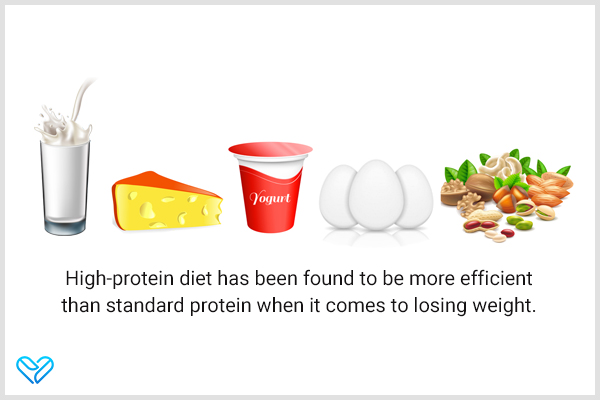
The three main macronutrients in the food we eat – carbohydrates, proteins, and fat – directly affect overall calorie intake and influence weight gain and weight loss.
Recently, however, protein has emerged as the main influencer when it comes to weight loss. This has been proven in multiple studies, where a high-protein diet was more efficient than standard protein when it comes to losing weight. (3)
High-protein diets are also beneficial as it helps reserve muscles while shedding fat, ultimately reducing the comorbidities associated with obesity. (4) When combined with exercise, a high-protein diet can lead to the development of strong lean muscle and can reduce weight more effectively.
A high-protein diet includes 23%–28% of the total calories, consisting of protein-rich sources such as lean meat, poultry, fish, beans, legumes, and dairy. (4) An easy way to assess adequate protein intake is ensuring a quarter of your plate at each meal is a protein source.
2. Take your daily dose of fiber
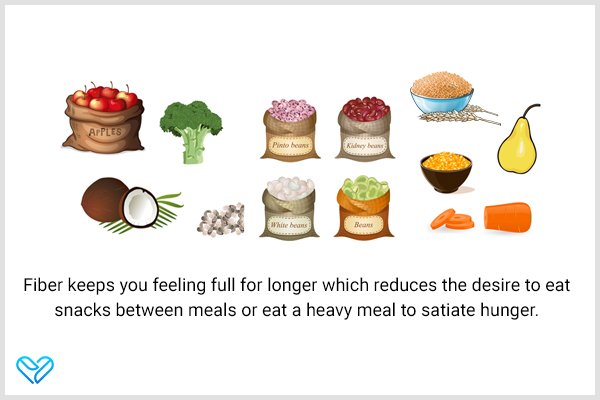
One of the most strategic ways to lessen total calorie consumption is “volume eating.” It is characterized by the consumption of a large amount of low-calorie foods such as soups or salads before your main meal to reduce the total calories consumed from denser foods. (5)
The main idea is to increase the feeling of fullness or satiety. Salads or fruit contain high amounts of fiber, which is directly responsible for increasing the feeling of fullness. (6) Not only that, fiber keeps you feeling full for longer, which reduces the desire to eat snacks between meals or eat a heavy meal to satiate hunger.
Include foods such as whole grains, fruits, legumes, whole pulses, nuts, and vegetables in your meals to consume a fiber-rich diet.
3. Indulge in home-cooked meals
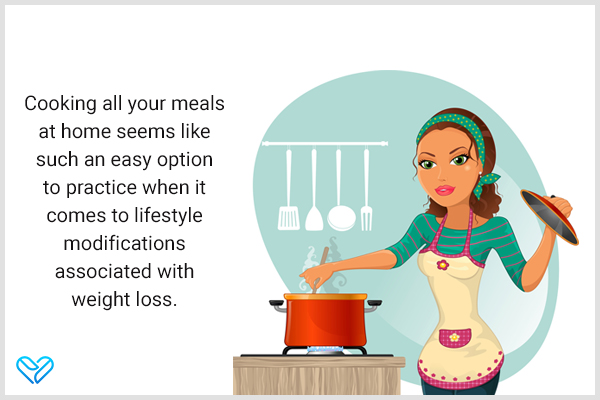
Cooking all your meals at home seems such an easy and simple option to practice when it comes to lifestyle modifications associated with weight loss.
But it has proven benefits not only in reducing the accumulation of fat but also in improving overall health by reducing the risk of developing heart disease, cancer, hypertension, depression, and diabetes. (7)
The main reason home-cooked meals can help is it ensures the quality of ingredients, prevents the use of overprocessed foods, and limits the use of salt and fat in the food.
In a large population study, it was seen that those who consume home-cooked meals more than five times a week as compared to three or fewer were 28% less likely to be overweight and 24% less likely to have excess body fat. (8)
Use fresh ingredients including whole grains, fresh fruits and vegetables, legumes, lean meat, fish, dairy, poultry, and unprocessed ingredients.
4. Eat your meals at the same time daily

It has been found that meal timings influence the circadian rhythm of the body, which influences the body’s alertness and sleep.
Eating your meals at the same time every day is an effective strategy to incorporate along with a weight loss diet. (9)
5. Move more
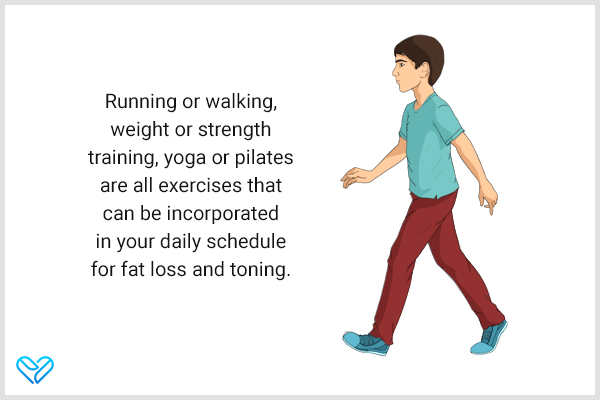
Diet and exercise are the first-line changes incorporated to lose excess body weight.
Exercise of 150 minutes each week is necessary to achieve significant weight loss, (10) but studies have also found that individuals who exercised 200 minutes per week lost more weight than those who exercised 150–199 minutes. Exercising for 200 minutes per week also aids in preventing regain of the weight. (11)
Running or walking, weight or strength training, and yoga or Pilates are all exercises that can be incorporated into your daily schedule for fat loss and toning.
The type of exercise plan that works best for you will be determined by your individual needs and mobility.
6. Do not skimp on your water intake
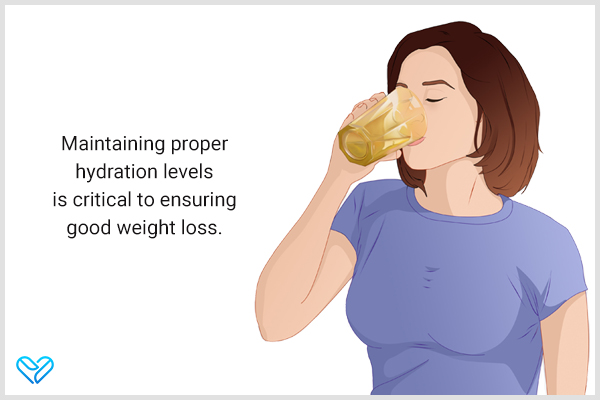
Maintaining proper hydration levels is critical to ensuring good weight loss. Oftentimes, the feeling of hunger is actually thirst, and drinking a glass of water can help bring satiety to reduce food and calorie consumption.
Another way drinking enough water helps weight loss is by increasing the rate of fat being burned in the body. (12)
Studies have found that people who drink adequate water throughout the day consume ~9% lesser calories. Another study has reported that women who drink more than 1 L of water each day successfully lose ~2 kg over 12 months of intervention. (13)
Water can successfully replace sugar-sweetened beverages to further decrease calorie intake.
7. Avoid drinking your calories
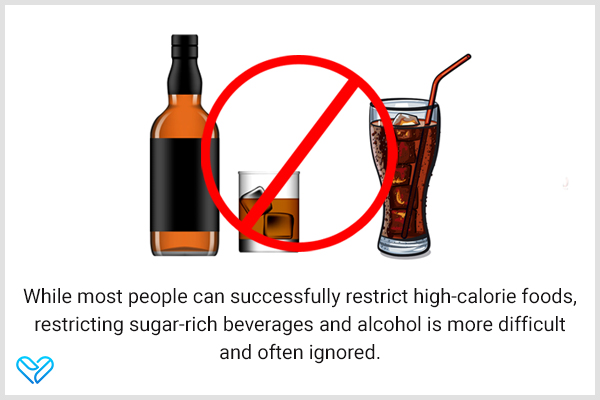
While most people can successfully restrict high-calorie foods, restricting sugar-rich beverages and alcohol is more difficult and often ignored.
A large part of the US population indulges in sugar-sweetened beverages as well as alcohol, which contributes to weight gain and obesity. (14) Therefore, abstaining from or limiting such drinks can benefit weight loss.
Choose infused waters, unsweetened herbal tea, and fresh fruit juices (without added sugar) as alternatives to high-calorie drinks.
8. Get your nightly Z’s

A good night’s sleep is not only important to alleviate fatigue and tiredness, but it also helps with weight loss.
Studies have reported better sleep to increase weight and fat reduction. (15)(16) Experts recommend sleeping for 7–8 hours each night in addition to calorie restriction and physical activity to lose weight successfully.
Why Weight Gain Occurs
Overeating is the single most prominent cause of gradual weight gain. According to studies, a 50–100 calorie increase in daily intake is what causes weight to rise in most people. (17)
However, other certain other reasons can also contribute to weight gain.
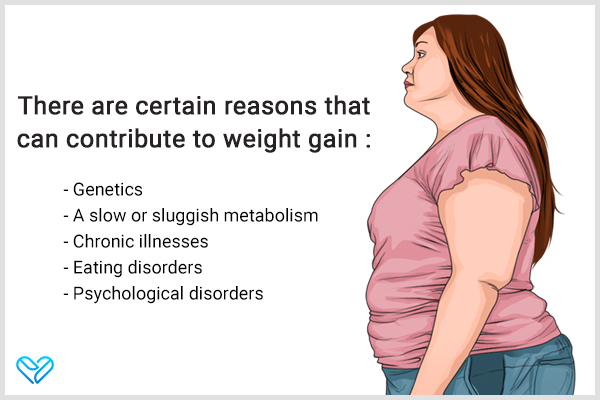
1. Genetics
Genes are predictors of many things including the way you look, the illnesses you may develop over time, allergies you may suffer from, the way you gain weight, and how fat is distributed in your body.
Genetic changes or mutations may cause changes in the hormones and enzymes involved in creating the feeling of hunger or satiety, creating an environment for weight gain to occur or causing organ malfunctions that result in increased fat storage in the body. (18)
While you cannot change your genetic influences, diet can be modified to minimize the impact of genes on causing weight gain. You may need a doctor’s supervision to identify and address genetic concerns.
2. A slow or sluggish metabolism
Metabolism is the main determinant of how quickly you digest your food and effectively use the nutrients from the food you are eating.
People with a fast metabolism are able to use the energy from food more quickly, which reduces their chances of gaining weight or storing fat. On the other hand, metabolically “thrifty” individuals are set up to store energy in the form of fat due to their slow metabolism. (19)
Metabolism can be increased with exercise and consuming foods that can boost it such as ginger, green tea, black pepper, and chilies.
3. Chronic illnesses
Obesity and chronic illnesses are interconnected. Multiple studies have found that diseases such as diabetes, hypertension, arthritis, and asthma are prevalent in populations that were overweight or obese. (20)(21)
Unfortunately, in these cases, medications and treatment of these diseases can also be major causes of weight gain. Studies have identified insulin treatment in the case of diabetes (22) as well as certain oral medication for asthma to also be linked to obesity in some individuals. (23)
It is important to remember that this side effect of obesity is prevalent only in some and not in all people with these illnesses.
4. Eating disorders
Eating disorders such as binge eating, night eating, emotional eating, and bulimia are a huge concern at the current time, especially in the teenage population.
Binge eating disorder (BED) is characterized by eating an unusual amount of food in a short duration, which leads to an extreme amount of weight retention. Night eating disorder is the consumption of food at times that other people typically do not consume (such as late at night or after waking up in the middle of the night). (24)
Managing eating disorders takes a joint effort from doctors, dietitians, and psychologists to aid recovery.
5. Psychological disorders
Psychological or mood disorders such as depression and anxiety can be major predictors of weight gain. This increased risk is, in turn, likely to further the issue of raising weight. (25)
A study done among people with depression found that people with obesity suffering from a depressive episode were five times more likely to overeat than people without obesity. (26)
Further evidence suggests that women are more likely to gain weight than men when suffering from depression. (27) Treating obesity associated with mood disorders is dependent on treating the underlying condition itself.
What You Need to Remember
Weight loss must be done under the supervision of your doctor and dietitian, especially if you have an illness or mood disorder. In addition, remember these points when starting a weight loss plan:
- Sustainable weight loss takes time, so do not lose motivation if you do not see immediate progress.
- Do not follow unsolicited diet plans or methods you see on the internet. Oftentimes, these pose more harm to the body and overall health. Instead, opt for a sustainable and long-term plan to achieve weight loss.
- Avoid processed foods such as lunch meat, ready-to-eat foods such as frozen pizza, and flavored coffee and coffee creamers as they all contribute to undesirable calories to the diet.
- Don’t get too hung up on calories and calorie counting. Just stick to the diet provided by your dietitian as closely as possible.
- Avoid indulging in “cheat days.”
Most-Asked Questions About Weight Loss
How long does it take to lose weight?
Weight loss is a complex mechanism that involves calorie restriction, exercise, and lifestyle modification. Your doctor or dietitian is the best person to plan a custom diet based on your needs while taking into account any additional illnesses or conditions.
Based on all parameters, sustainable weight loss may take 6 months to a year.
Should I start my day with lemon water?
You can start your day with lemon water as the hydration will help flush your digestive system and the lemon can boost metabolism and digestion. However, you should not rely on drinking lemon water for weight loss as it does not have the ability to burn fat.
If you do consume lemon water, avoid drinking too much or adding excessive lemon juice to water as it is known to cause side effects such as erosion of tooth enamel, digestive issues such as heartburn and acidity, and the development of ulcers in those who are prone to them. (28)
Does drinking apple cider vinegar on an empty stomach help?
Diluted apple cider vinegar (1 tablespoon in a glass of water) can delay gastric emptying, meaning it keeps you full for longer. In addition, it has been found to decrease the insulin spike from a meal. All of these can work together to keep you from overeating throughout the day and consuming excess calories. (29)
However, some people may not be comfortable drinking apple cider vinegar as it can cause reflux disorder or acidity issues in those who are prone to them. If you experience any discomfort, discontinue apple cider vinegar consumption immediately.
Can I drink coconut water to lose weight?
Coconut water is excellent for hydration. It contains minerals and electrolytes that can provide hydration, and it is a natural alternative to high-calorie beverages.
While some evidence suggests coconut water can prevent the accumulation of fat in the body, (30) calorie restriction and exercise remain the primary weight loss strategies.
Practical Takeaways
- Weight gain and obesity are becoming an increasing public health concern.
- While overeating and lack of physical activity are the main reasons a person gains weight and fat, other factors that influence weight gain include diabetes, slow metabolism, mood disorders, and eating disorders.
- Addressing these factors can help with weight loss, but there are also certain changes you can make at home to develop an effective weight loss plan.
- Apart from calorie restriction, other effective weight loss strategies include eating a high-protein diet, staying hydrated, exercising 200 minutes per week, eating home-cooked meals at the same time daily, consuming high-fiber foods, getting proper sleep (at least 7–8 hours), and avoiding high-sugar beverages and alcohol.
- Was this article helpful?
- YES, THANKS!NOT REALLY


